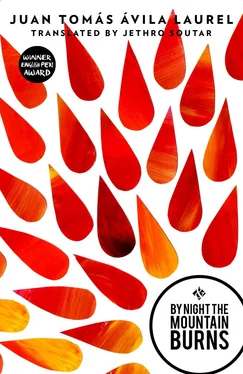Juan Ávila Laurel - By Night the Mountain Burns
Здесь есть возможность читать онлайн «Juan Ávila Laurel - By Night the Mountain Burns» весь текст электронной книги совершенно бесплатно (целиком полную версию без сокращений). В некоторых случаях можно слушать аудио, скачать через торрент в формате fb2 и присутствует краткое содержание. Год выпуска: 2014, Издательство: And Other Stories Publishing, Жанр: Современная проза, на английском языке. Описание произведения, (предисловие) а так же отзывы посетителей доступны на портале библиотеки ЛибКат.
- Название:By Night the Mountain Burns
- Автор:
- Издательство:And Other Stories Publishing
- Жанр:
- Год:2014
- ISBN:нет данных
- Рейтинг книги:5 / 5. Голосов: 1
-
Избранное:Добавить в избранное
- Отзывы:
-
Ваша оценка:
- 100
- 1
- 2
- 3
- 4
- 5
By Night the Mountain Burns: краткое содержание, описание и аннотация
Предлагаем к чтению аннотацию, описание, краткое содержание или предисловие (зависит от того, что написал сам автор книги «By Night the Mountain Burns»). Если вы не нашли необходимую информацию о книге — напишите в комментариях, мы постараемся отыскать её.
By Night the Mountain Burns — читать онлайн бесплатно полную книгу (весь текст) целиком
Ниже представлен текст книги, разбитый по страницам. Система сохранения места последней прочитанной страницы, позволяет с удобством читать онлайн бесплатно книгу «By Night the Mountain Burns», без необходимости каждый раз заново искать на чём Вы остановились. Поставьте закладку, и сможете в любой момент перейти на страницу, на которой закончили чтение.
Интервал:
Закладка:
A few minutes later, there was not much left to be said about that man’s life. He didn’t expire the way many people expire, the soul ripping out of the body in a transcendental moment everyone present is very much aware of. Those present simply realised he was no longer with them, he was no longer alive. So they called the doctor and he certified the death, the end of the man’s life on the island. Then they closed his eyes and arranged his hands to show he was no longer going to use them. He would be taken home and preparations would be made for his funeral. The hospital lent its only stretcher and he was carried back to the house he’d lived in and put in the only place there was room for him, the bed. The same bed where he’d had painful cramps, succumbed to his needs and begun to die. Now it was time to prepare his coffin. On our island, coffins are made out of old canoes. And if there isn’t an old one available, though there usually is, a canoe is sacrificed, even if it’s still fit for the purpose it was built for, in order to provide a last resting place for the deceased. And if the canoe that’s sacrificed to make the coffin is the canoe that used to belong to the dead man, all the better. I guess the custom of making the coffin out of the dead man’s canoe comes from the idea that once a man is dead, he no longer has use for the canoe that survived him. It was unusual for someone to inherit someone else’s canoe. Our village’s custom was that when a man died, his canoe died with him, that it felt the weight of earth thrown down on its back at its owner’s burial. Besides, our village wasn’t so full of trees that one could be chopped down every time someone died. There weren’t enough trees for such a ritual.
I’ve been talking about canoes being turned into coffins to bury their dead owners, but what about the women, who on our island never owned canoes? Well, their coffins were made from the leftovers of other people’s canoes. Luckily, there were plenty of big canoes on the island, made from three indigenous trees, or tree trunks from elsewhere that washed up on our beaches, brought by the sea from foreign oceans and shores. And when the canoes got old and had so many holes in them they could no longer be used for paddling, they were abandoned upturned on the shore, and we children always asked what they were for and whom they belonged to. Because we knew nothing about what happened to the dead. But we soon began to learn.
They made the dead man a coffin and in the afternoon they went to bury him, following the procedure I described earlier. All the children who lived on the streets of the funeral procession were shut up in their homes with the windows covered up, forbidden from going outside until the adults got back. The dead man was cried for, his wife cried a lot, his relatives cried too. And finally the man was buried. But the following day, his wife had further cramps, and she thought it was because she had cried so much for her husband, and because she’d not eaten since he’d fallen ill. The cramps continued and at night she had to ask someone to accompany her to the beach. She asked one of her relatives, for they were sleeping in the house awaiting the return of the dead man, as is our custom. When somebody dies, relatives sleep in the deceased’s house for a week and it’s said that on the third day they feel the return of the departed, by the noise it makes, even the objects it touches. But three days hadn’t yet passed and the dead man’s wife asked one of the relatives to accompany her to the shore, for her needs were urgent and painful. She wasn’t alone in the house and so she couldn’t resort to using the chamber pot. She went down to the shore and her belly ached a lot, a belly that had been fed practically nothing since the terrible episode with her husband began. She was now widowed from that man and there were external signs of this, for she’d shaved her hair off and wore black. She was in a lot of pain, she clenched her teeth and held her belly with her hands and she was dripping with sweat. It was said that her sweating alone was cause for alarm, for it was no ordinary outpouring of sweat. The pains continued, but she straightened herself up and made her way home. She went back to bed, but when the next wave of cramps came she no longer had the strength to ask anyone to accompany her anywhere. She went into the sleeping room, where no one was sleeping, for everyone, including herself, slept in the living room while awaiting the return of the departed, and there she resorted to the chamber pot. She no longer had the will to protect her modesty and hold back the groans of the strained removal of the nothing that filled her intestines. Those groans startled the neighbours and some of the women started to cry. They knew it was something serious, knew it might be the same thing that had happened to her husband, and they went to get help. They went to knock on the doctor’s door and he got up, got dressed and followed them, and he told them to do as he instructed. There was nothing he could do to stop the propulsions that were so painfully churning her intestines, but he saw what was coming and so he told them to take the woman to the hospital, even though it was closed at that time, because it wasn’t properly speaking a hospital, the sort of place you could go to day and night and be attended to. And in any case, there was no medicine anywhere on the island that could be given to anyone for any kind of ailment.
Hours went by, the woman’s eyes went blank and her soul ripped out of her body, to the general disbelief of everyone present, who’d expected her to make a recovery. Her death was a dramatic transcendental moment. Those present screamed to the heavens and cried as if the life had been ripped out of their own bodies. They were not mere tears of lament. They took the woman home, made the usual funeral arrangements and a coffin out of the wood left over from her dead husband’s canoe. Then they called the priest and the funeral procession set off all over again: the priest and the altar boys carrying incense and candles, followed by the men bearing the coffin and the women crying behind them, tears that were not, as I said, mere tears of lament, rather something much, much more.
The woman was buried and the house was shut up, for that man and woman hadn’t any children, or if they had, they were elsewhere and nobody mentioned them or knew anything about them. After those two deaths the sky closed in over the island and the sun stopped shining on it. And death drew strength from this. In the days that followed, everyone who’d helped try to save that husband and wife started to die, one by one, struck down by the same affliction that had beset the dead man and woman. And so, rather than burying one old person over the course of a year, the island was now burying someone every day. What was this? people asked themselves. And they asked the doctor the same thing and he, along with others who knew about such matters, concluded that what was threatening to wipe out every inhabitant on the island was a sickness called the cholera. But that was as far as the doctor’s knowledge went. There was nothing on the island that could be given to people to treat or combat the disease, nothing in the hospital cupboards that could stop the great loss of life.
This all took place at a time when the church was marking the death of Nuestro Señor . On the days that preceded the Resurrección , special songs were sung to commemorate the date. And women in mourning dress opened their throats and sang, in our language, the bit about ‘they put a crown of thorns on him and then nailed him to the cross, and then he died and they buried him to save sinners’. I’ve just said it all at once, run together, but when said in our language, when sung in our language by the women, it had a different rhythm, a rhythm that was deadly slow, and I knew they were singing it for what was happening on our island and not for what happened to Cristo . Back then I’d already taken my first Communion but I didn’t know the story of the Señor they put a crown of thorns on and nailed to a cross. This was because the ‘ doctrina cristiana ’ was taught to me in Spanish, a language that was not my own, and so I understood practically nothing of what I was supposed to learn before taking my first Communion. All I knew was that to take my first Communion I had to know the doctrina off by heart. ‘And he suffered, and he suffered, and he was nailed to the cross’, and I thought, Dios mío , we’re all going to die, seeing so many people buried because of that sickness we’d never heard of before. The cholera. The doctor and the others then realised that the death was contagious and so everyone who declared themselves sick had to be taken out of their homes, so as not to pass death on to other members of the family. We shut ourselves away in the house the same way we did when a funeral was taking place, when we had to hide from the air of the dead. Near the Misión there was a big house that had no rooms in it, as if it had also been built as a church, though one without any kind of adornments and much, much smaller. They opened it up and from then on anyone suffering from the deadly sickness of the cholera was put in there. But as it had never been a hospital, it had no beds, and so the people who were taken there, people who knew they were going to die, were laid out on the floor itself, covered in the sheets or drapes they’d been carried from their houses in. As there was nothing anywhere on the island to give them, they were given nothing, unless their family had something they thought might keep them going, at least for a few days until they inevitably died. And throughout that month, people kept singing ‘they put a crown of thorns on him, then nailed him to the cross’. But in my language it’s more graphic than it is in Spanish, and the nails themselves get mentioned, which made it seem all the more painful. In my language you say ‘they drove nails into him on the cross, then he died’, and our people kept on dying and I knew that song was being sung for them.
Читать дальшеИнтервал:
Закладка:
Похожие книги на «By Night the Mountain Burns»
Представляем Вашему вниманию похожие книги на «By Night the Mountain Burns» списком для выбора. Мы отобрали схожую по названию и смыслу литературу в надежде предоставить читателям больше вариантов отыскать новые, интересные, ещё непрочитанные произведения.
Обсуждение, отзывы о книге «By Night the Mountain Burns» и просто собственные мнения читателей. Оставьте ваши комментарии, напишите, что Вы думаете о произведении, его смысле или главных героях. Укажите что конкретно понравилось, а что нет, и почему Вы так считаете.












